
Moldavia is a historical region and former principality in Central and Eastern Europe, corresponding to the territory between the Eastern Carpathians and the Dniester River. An initially independent and later autonomous state, it existed from the 14th century to 1859, when it united with Wallachia as the basis of the modern Romanian state; at various times, Moldavia included the regions of Bessarabia, all of Bukovina and Hertsa. The region of Pokuttya was also part of it for a period of time.

The Crimean War was fought from October 1853 to February 1856 between Russia and an ultimately victorious alliance of the Ottoman Empire, France, the United Kingdom and Sardinia-Piedmont.

The Greek War of Independence, also known as the Greek Revolution or the Greek Revolution of 1821, was a successful war of independence by Greek revolutionaries against the Ottoman Empire between 1821 and 1829. In 1826, the Greeks were assisted by the British Empire, Kingdom of France, and the Russian Empire, while the Ottomans were aided by their North African vassals, particularly the eyalet of Egypt. The war led to the formation of modern Greece, which would be expanded to its modern size in later years. The revolution is celebrated by Greeks around the world as independence day on 25 March every year.

The Russo-Turkish War (1806–1812) between the Russian Empire and the Ottoman Empire was one of the Russo-Turkish Wars. Russia prevailed, but both sides wanted peace as they feared Napoleon's moves to the east.
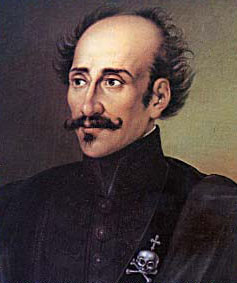
Alexandros Ypsilantis was a Greek nationalist politician who was member of a prominent Phanariot Greek family, a prince of the Danubian Principalities, a senior officer of the Imperial Russian cavalry during the Napoleonic Wars, and a leader of the Filiki Etaireia, a secret organization that coordinated the beginning of the Greek War of Independence against the Ottoman Empire.
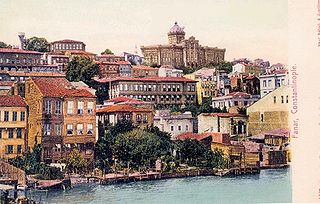
Phanariots, Phanariotes, or Fanariots were members of prominent Greek families in Phanar, the chief Greek quarter of Constantinople where the Ecumenical Patriarchate is located, who traditionally occupied four important positions in the Ottoman Empire: Voivode of Moldavia, Voivode of Wallachia, Grand Dragoman of the Porte and Grand Dragoman of the Fleet. Despite their cosmopolitanism and often-Western education, the Phanariots were aware of their Greek ancestry and culture; according to Nicholas Mavrocordatos' Philotheou Parerga, "We are a race completely Hellenic".

Tudor Vladimirescu was a Romanian revolutionary hero, the leader of the Wallachian uprising of 1821 and of the Pandur militia. He is also known as Tudor din Vladimiri or, occasionally, as Domnul Tudor.
Yiannis Pharmakis or Ioannis Farmakis (1772–1821), born in Vlasti, Macedonia (Greece), was a Greek revolutionary leader of the Greek War of Independence, active in Wallachia and Moldavia.

The House of Ypsilantis or Ypsilanti was a Greek Phanariote family which grew into prominence and power in Constantinople during the last centuries of Ottoman Empire and gave several short-reign hospodars to the Danubian Principalities.

Giorgakis Olympios was an armatole and military commander during the Greek War of Independence against the Ottoman Empire. Noted for his activities with the Filiki Eteria in the Danubian Principalities, he is considered to be a leading figure of the Greek Revolution.
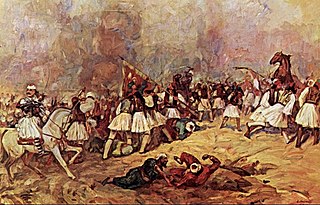
The Battle of Petra was the final battle fought in the Greek War of Independence.
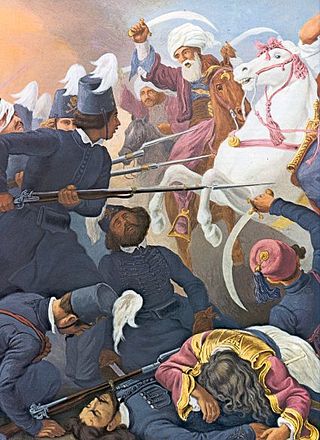
The Battle of Drăgășani was fought on 19 June 1821 in Drăgășani, Wallachia, between the Ottoman forces of Sultan Mahmud II and the Greek Filiki Etaireia insurgents as a part of the Greek War of Independence.

The Sacred Band was a military force founded by Alexander Ypsilantis at the beginning of the Greek War of Independence, in the middle of March 1821 in Wallachia, now part of Romania. It was formed by volunteers students of the Greek communities of Moldavia, Wallachia and Odessa. It was the first organized military unit of the Greek War of Independence (1821) and of the Greek army in general. Ypsilantis thought that these young people could become the soul of his army. That was the reason that he borrowed the name of the Sacred Band of Thebes.
Athanasios Pipis or Thanas Pipi was a Greek priest and the Greek Orthodox revolutionary commander in the Greek War of Independence (1821–1830).

The Prut is a 953 km (592 mi) long river in Eastern Europe. It is a left tributary of the Danube. In part of its course it forms Romania's border with Moldova and Ukraine.

Prodan Gligorijević, known simply as Hadži-Prodan was a Serbian voivode in the First Serbian Uprising of the Serbian Revolution, then the Greek War of Independence, against the Ottoman Empire. He led an unsuccessful rebellion in 1814, dubbed Hadži Prodan's Revolt.
Some Serbs joined the Greeks, their co-religionists, in the Greek War of Independence (1821–29). Volunteers arrived from Serbia, Montenegro, and territories still under Ottoman rule, to fight alongside the Greek rebels against the Ottoman Empire. Several of the volunteers were veterans of the Serbian Revolution, such as Hadži-Prodan.
Alexandru Cantacuzino-Deleanu or Alexandros Kantakouzinos was a Phanariote Romanian-Greek magnate and politician.
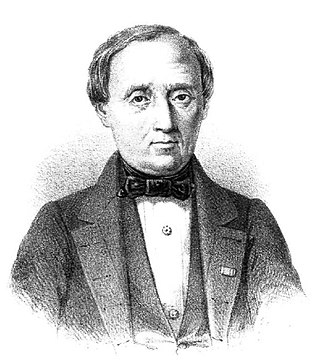
Anastasios Manakis or Michaloglou was a Greek revolutionary of the Greek War of Independence.














